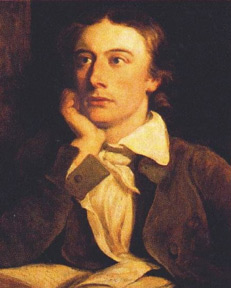|
John Keats :
The cynosure of female eyes
by Gwen Herat
[Part 2]
Strange as it were, John Keats's biographers were women. Frances Mary
Ownens found him too irresistible and sums him up with a stanza
comparing him to Adonais.
‘He is a porrion of the loveliness.....
|

Isabella in an oil painting by American artist John
White done in 1897 that shows her with the head of her
murdered lover in a pot of Basil from Keat's symphonic
poem. |
Bursting in its beauty and might. From trees and beasts and men into
Heaven's light ....”
Dorothy Hewlett went still further in her adoration for the poet
writing about his unhappy end. He was frail and unhappy which made him
the popular Victorian beautiful youth of genius.
Keats the fragile butterfly is cast as a wronged female. He was an
unmanned defenceless child. Many of his letters were written about his
feelings in Lamia with suggestions of erotic fascination. They reveal
men subjecting women to the control of the male desires.
Keats was full of aesthetic ideology in most of his poems. It came
naturally the moment he picks his pen.
In La Belle Dame Sans Merci, the characteristic ambivalence of Keats
rise in eroticism and display contradictory signals.
Keats allows narrative judgement of the lady who had a hidden design
no sooner he met and courted her.
The intentional actions suggest La Belle Dame Sans Merci to be less
culpable in betrayel of men's desire than a figure defined in terms of
representing kings, princes, warriors and knights.
Isolation
The identified lady is La Belle. The rejection of the Knight's
indulgence associates with her the erotic luxury of sensuality.
For the poet a typical world of isolation of feminine inhibitions
such as nymphs and goddesses. There was a gender conflict in his earlier
poems which only manifested to punish the male lover for betrayal.
The same problem arose for him in Lamia that had disastrous
consequences whereas erotic fascination competes with reality to claim
natural manly life of which Keats never seemed to have agreed. Yet, he
wanted to prove that manliness is only next to womanhood.
Obviously he felt a psychic integrity was against self felt
powerlessness that revealed in terms of deep suspicion that he had
towards many of his contemporaries who sneered at him though Keats's
ambivalent negotiations with the fairer sex were intensified by his
uncertain evaluation that represented as feminine.
Was he right?
Keats admits that his divergence from identified figures of manliness
to effeminacy much to the annoyance of many scholars of the day. His
character is a self- proclamation in Keats's Letters-78 if one were to
study deeply.
Flexibility
Keats tends to rely on the flexibility of his imagination rather than
transcend on male identity for which he had little regard other than
placing them far behind the fairer sex.
But Keats was no coward because he found on many instances to
circumscribe any playful androgyny if they were his worries.
But they were not.
Neither did he depend on sympathy that left him as a subjective
power.
He redeemed himself from passivity of suggestive emasculation and
power and not be a slave to such unfair criticism voiced by some of his
contemporaries.
He was, more or less, least interested in their opinion.
But Keats had a problem. He found himself awkward in society,
especially at the gathering of scholars.
The musings of the ambiguous boundaries among masculine and feminine
are normally confined to close friends and family but Keats's vulnerable
sense of masculinity in relation to the world at large may have
embarrassed him. It was so strongly established, that there was no way
out but to put up with unsavoury opinion.
|

John Keats |
To express his frustration, often Keats depended on illusions or
imagined a sexual drama with the conviction that put confidence into his
poetry.
In Keats's Letters, there is a wide array from which we can draw our
opinion that can be different to the reader of his time.
Poetry has changed by leaps and bounds where poets tend to rely on
prose and stanzas over the rigid poetry System of rhyming sentences to
sound alike. Keats stood between these two systems.
They can be noticed in his later works.
Manhood
Keats's manhood has always been an issue to the average critic who
never overstepped his authority to punish the poet for a reason he was
born into and not acquired. Some were sympathetic but many thought him
to be squirmish.
Did Keats mind it? Probably not.Today's readers are educated that
they overlook such impurities. Rudolf Nureyev, the iconoc Russian dancer
was a noted homosexual.
But the world of art hailed him in such high esteem and he mingled
with royalty. If it did not sound putrid to those who mattered; why then
look down on Keats in his world of high literature or poetry?
Though Keats appeared sensitive, he had the capacity and the strength
to ignore his critics.
The recent Penguin selection of Keats's poems by John Bernad begins
with his Republican poem written in May which is the anniversary of the
Restoration of Charless II.
‘Infatuate Britons, will you still proclaim
His memory, you direst, foulest shame?
Nor patriots revere?’ |

